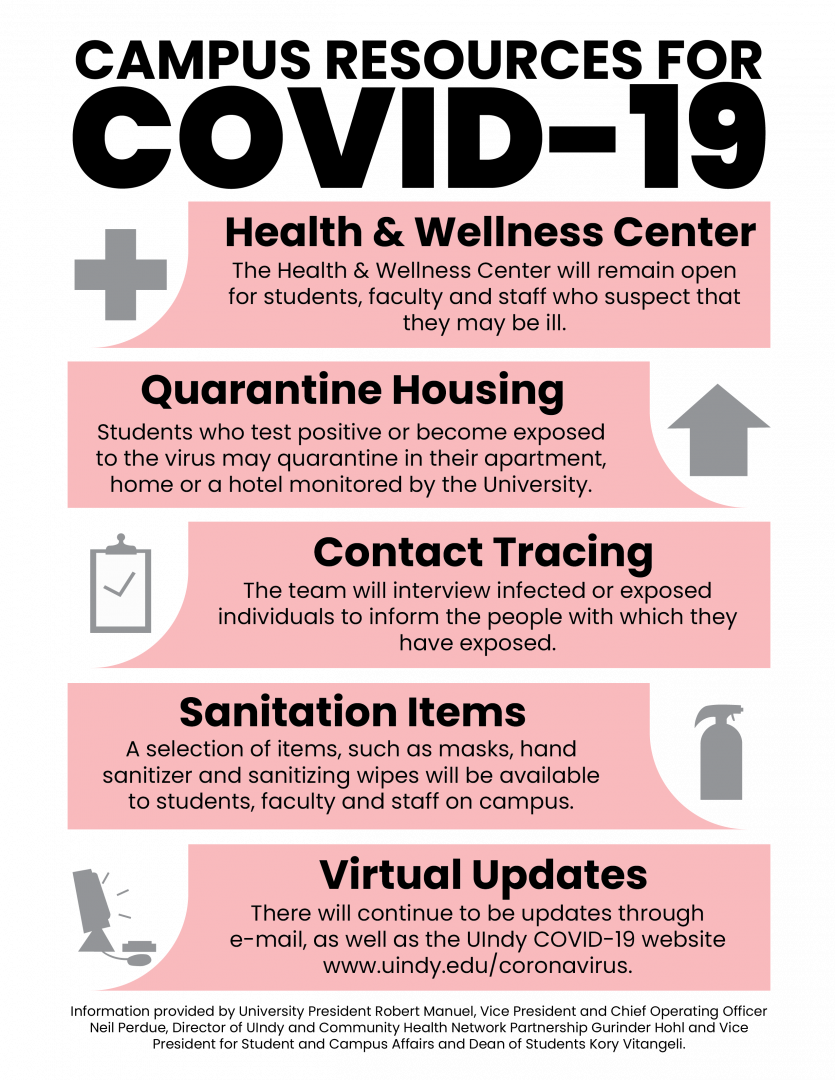This semester at the University of Indianapolis, the goal is to protect the campus community, according to University President Robert Manuel. With that, UIndy has implemented specific protocols given the COVID-19 pandemic, Manuel said.
If someone on campus feels ill, has not received a positive COVID-19 test and they have not been notified of coming into contact with someone who tested positive, then those students, faculty and staff can reach out to the Health and Wellness Center, according to Vice President, Chief Operating Officer and UIndy COVID-19 Task Force Co-Chairman Neil Perdue.
However, if someone on campus does not feel well and shows symptoms, or suspects they have come in contact with someone who has tested positive, then the next step for them depends on whether or not they are a student, faculty or staff, according to Perdue. Students who have tested positive for COVID-19 should reach out to Vice President of Student Affairs and Dean of Students Kory Vitangeli, and faculty and staff should report to the Director of Human Resources Erin Farrell, according to Perdue.
“What they [Vitangeli and Farrell] do is they have a series of questions that they’ll ask to gather some more information from you,” Perdue said. “They will make a handoff to our contact tracing lead.”
Director of Contact Tracing Gurinder Hohl said the contact tracing team consists of public health graduate assistants who are specifically trained to assist her. She said when she and her team receive a student, faculty or staff member’s information, the team will contact them by phone or e-mail. The team will interview them regarding symptoms, testing and exposure, Hohl said. According to Hohl, the purpose of contact tracing is to look at the individuals at the center of an infection, as well as those with which the individuals have been in contact.
“The reason we do that is not only to provide guidance to the person who is infected, but also to those who may have come in contact with this infected individual so that they can follow precautions,” Hohl said.
Depending upon the level of the symptoms, infected or exposed individuals are to self-isolate for 10 to 14 days, according to Hohl. Manuel said that the university has made arrangements with a hotel in which students will have the opportunity to quarantine, as well as having the option to do so from their homes.
The hotel is monitored and managed, and food service delivery will be coordinated, Manuel said. On-campus apartment residents may have the opportunity to quarantine in their apartments, he said. Quarantine spaces will depend on the specific situations of these students, according to Vitangeli.
The university will report positive cases to the Marion County Health Department and the Indiana State Department of Health, according to Manuel. This will get positive COVID-19 test results into the state’s contact tracing system and allow affected individuals and those who have come in contact with them to be notified if possible, Manuel said.
For students, faculty and staff who will be on campus, the university will provide items such as reusable masks, hand sanitizer and sanitizing wipes, according to Perdue. The university will work with the Office of Student Affairs to confirm the on-campus locations where commuter students can receive their items, Perdue said. Faculty who are teaching in-person classes will receive kits with helpful materials and staff members will get their materials from their department hubs, according to Perdue.
“This is a community reality,” Manuel said. “…. We need everybody’s cooperation to ensure that we are following the best guidance the public health officials are giving us to make sure that we are safe and secure.”








